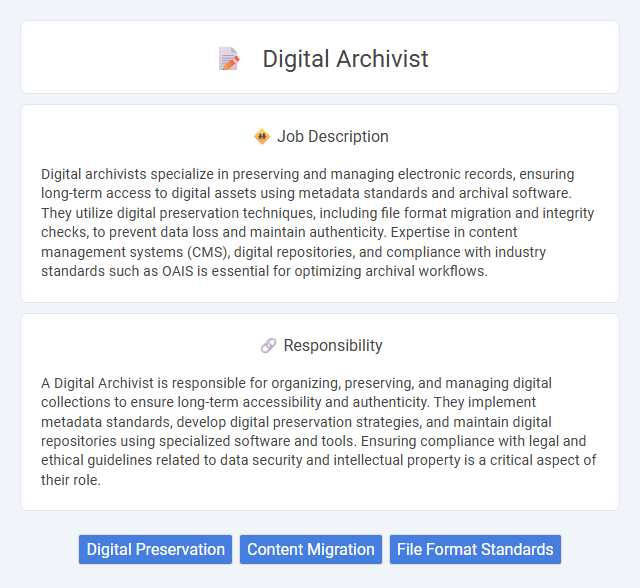
Digital archivists specialize in preserving and managing electronic records, ensuring long-term access to digital assets using metadata standards and archival software. They utilize digital preservation techniques, including file format migration and integrity checks, to prevent data loss and maintain authenticity. Expertise in content management systems (CMS), digital repositories, and compliance with industry standards such as OAIS is essential for optimizing archival workflows.
Individuals with strong organizational skills and a passion for preserving historical materials are likely well-suited for the role of a Digital Archivist. Those who are detail-oriented and comfortable with technology probably find satisfaction in managing digital collections and ensuring accurate metadata. People who prefer solitary, focused work environments may have a higher probability of thriving in this career, whereas those seeking highly social or fast-paced settings might feel less aligned with the demands of the job.
Qualification
Digital Archivists must possess a degree in library science, information management, or a related field, often supplemented by certifications such as Digital Archives Specialist (DAS). Proficiency in metadata standards, digital preservation techniques, and archival software like Archivematica or Preservica is essential. Strong analytical skills, attention to detail, and experience with data curation and digital asset management systems enhance effectiveness in maintaining digital collections.
Responsibility
A Digital Archivist is responsible for organizing, preserving, and managing digital collections to ensure long-term accessibility and authenticity. They implement metadata standards, develop digital preservation strategies, and maintain digital repositories using specialized software and tools. Ensuring compliance with legal and ethical guidelines related to data security and intellectual property is a critical aspect of their role.
Benefit
A Digital Archivist may likely enjoy benefits such as enhanced job stability due to growing demand for digital record management and preservation. There is a high probability of gaining access to innovative technologies that streamline data organization and retrieval processes. Improved career growth opportunities and competitive salaries might also be common advantages in this field.
Challenge
The role of a Digital Archivist likely involves navigating complex digital preservation challenges due to rapidly evolving technology and formats. Managing large volumes of data while ensuring authenticity and accessibility may pose significant difficulties. It is probable that staying current with emerging digital tools and standards is essential to successfully address these obstacles.
Career Advancement
Digital Archivists with expertise in metadata standards, digital preservation, and archival management systems can advance to senior roles such as Digital Preservation Manager or Chief Archivist. Proficiency in emerging technologies like AI for automated cataloging and blockchain for secure records management enhances career growth opportunities. Pursuing certifications like Certified Archivist (CA) or Digital Archives Specialist (DAS) further boosts qualifications for leadership positions in academic, corporate, or government archives.
Key Terms
Digital Preservation
A Digital Archivist specializes in the management, preservation, and organization of digital records to ensure long-term accessibility and authenticity. Utilizing advanced digital preservation techniques such as metadata tagging, format migration, and data redundancy, they safeguard digital assets from technological obsolescence and data loss. Expertise in digital repositories, archival standards like OAIS, and preservation software enhances the integrity and usability of digital collections over time.
Content Migration
Digital Archivists specializing in content migration ensure the accurate transfer of digital records from legacy systems to modern platforms while preserving data integrity and metadata accuracy. They utilize advanced migration tools and implement standardized protocols to facilitate seamless conversions, minimizing data loss and maintaining compliance with archival standards like OAIS. Expertise in file format compatibility, metadata mapping, and version control is critical for optimizing digital preservation and long-term accessibility.
File Format Standards
Digital Archivists ensure the long-term preservation and accessibility of digital records by adhering to established file format standards such as PDF/A, TIFF, and XML. Mastery of these formats supports data integrity, interoperability, and compliance with institutional or legal requirements. Expertise in digitization workflows and metadata standards enhances the accurate cataloging and retrieval of digital assets.
 kuljobs.com
kuljobs.com